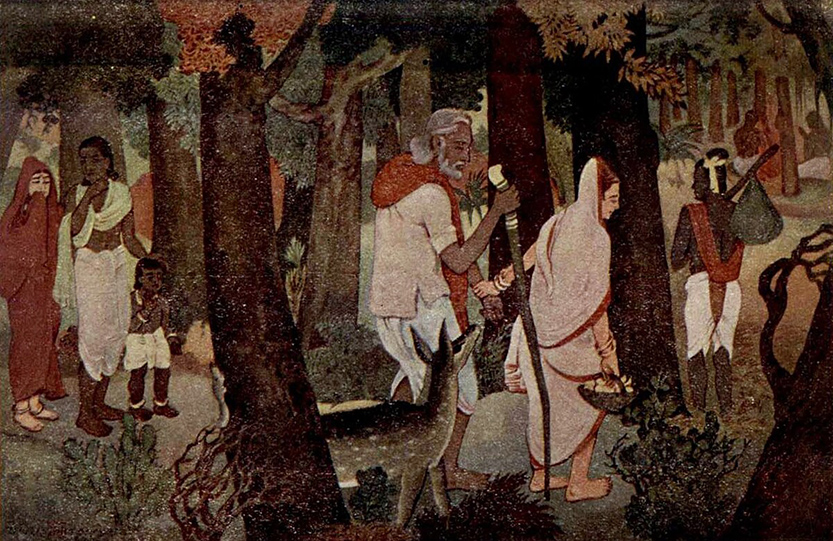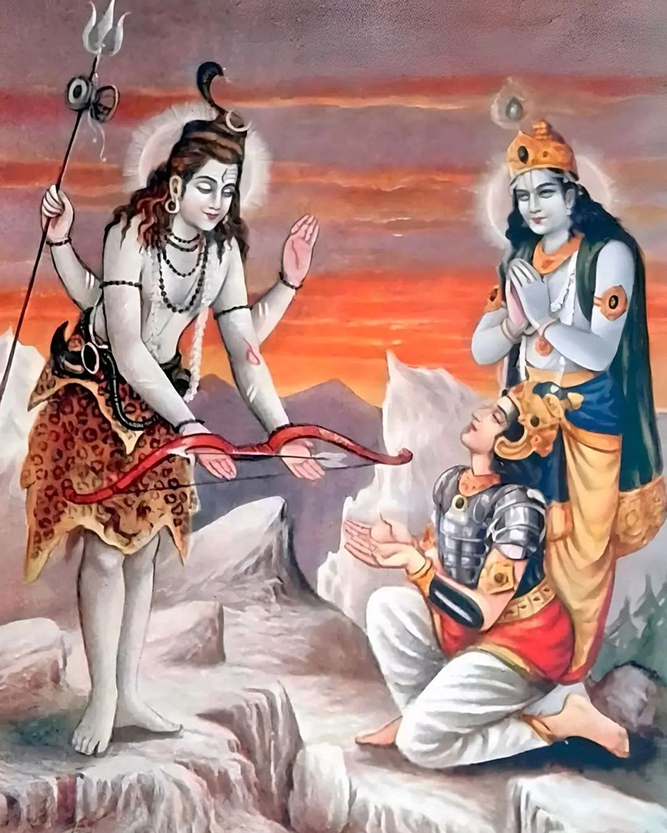Sauti said: 'The great-souled royal sage and lord of Earth, Janamejaya,1 the son of the Parīkṣit,2 organized a snake sacrifice. There, in his presence, Vaiśampāyana3 recited correctly the wonderful and sacred stories composed by Kṛṣṇa Dvaipāyana.4 After listening to those diverse stories of the Mahābhārata, I wandered among several places of pilgrimage and sacred waters. I finally came to the sacred place known as Samantapañcaka,5 venerated by the twice-born. This is the land where, a long time ago, a war was fought between the Kurus6 and the Pāṇḍavas7 and all the kings of the Earth. After that, anxious to see you, I have come before you. O revered sages! You shine like the sun's fire in this sacred place of sacrifice. In my view, you are like Brahma to me; you are pure through having performed sacred rites and meditation, and you maintain the fire of sacrifice. [recheck 10/8238 Location 112/103481]
---------------
1. Janamejaya (जनमेजय), this name means "victorious from birth." He was the son of Parīkṣit, who came to the throne at a young age due to his father's untimely demise. When he came of age and came to know that his father was killed by the king of serpents, Takṣka (तक्षक), he decided to perform a sacrifice to kill all the serpents in the world. The sacrifice was only partially successful, as most snakes were exterminated. Due to Vyāsa's last-minute intervention, the sacrifice was incomplete, and Takṣka escaped his fate.
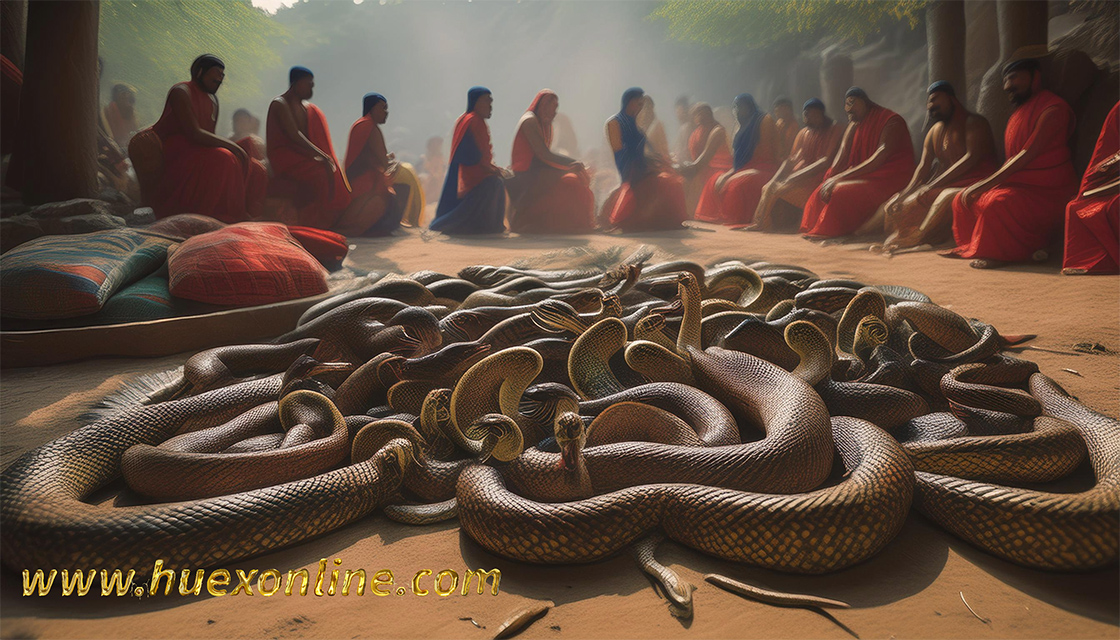
Snake Sacrifice by King Janamejaya was developed on July 22, 2024.
3. Vaiśampāyana (वैशंपायन), one of the intelligent disciples of Vyāsa.
4. Kṛṣṇa Dvaipāyana Vedavyāsa (कृष्णद्वैपायन वेदव्यास) or Vyāsadeva, thus named because he classified the Vedas. Vedavyāsa or Vyāsadeva is a title, and there has been more than one sage with such a title. This particular Vedavyāsa's name was Kṛṣṇa Dvaipāyana: Kṛṣṇa because he was dark in complexion and Dvaipāyana because he was born on an island (द्वीप - Dvīpa) of the Yamuna River (यमुना नदी).
5. Samantapañcaka (समन्तपञ्चक), a holy bath founded by Paraśurāma (परशुराम), and the five rivers through which blood flowed, and At the ending and the beginning periods of the two yugas Dvāpara and Kali, the Kauravas (कौरव) and the Pāṇḍavas (पाण्डव) fought the great battle at this place, and with the advice of Balabhadrarāma (बलभद्रराम) that this place was selected as the battlefield, and Duryodhana (दुर्योधन) was killed at Samantapañcaka (see in Śalya Parva).
6. The Kurus (कुरु) is the name of an Indo-Aryan tribe and kingdom in the Vedic civilization of Bhārata (भारत). Their kingdom was located in modern Haryana. Bhīṣma (भीष्म) was their guardian.
7. The Pāṇḍavas (पाण्डव) were the five acknowledged sons of Pāṇḍu (पाण्डु) by his two wives Kuntī (कुन्ती) and Mādrī (माद्री). Their names are Yudhiṣṭhira (युधिष्ठिर), Bhīma (भीम), Arjuna (अर्जुन), Nakula (नकुल) and Sahadeva (सहदेव). All five brothers were married to the same woman, Draupadī (द्रौपदी). Together, the brothers fought and prevailed in a great war against their cousins, the Kauravas, which came to be known as the Battle of Kurukṣetra (कुरुक्षेत्र). Their alienated half-brother Karṇa (कर्ण) fought against them and was eventually slain by Arjuna.
.
.
Page 3
O you who are twice-born!1 You are beyond all cares. What shall I say? Shall I speak of the history of kings among men and sages and great souls?
The sages replied: 'Tell us that ancient story that was told by the supreme sage Dvaipāyana, that which was worshipped by the gods and the Brāhmaṛṣis2 when they heard it - and that which is full of wonderful words and divisions and is the supreme of narratives, with subtle meaning and logic, adorned with the essence of the Vedas.3 That sacred history of the Bhāratas is beautiful in language and meaning and includes all other works. All the Śāstras4 add to it, and that sacred composition of great Vyāsa has been added to the four Vedas. We wish to hear that holy collection that drives away the fear of sin, just as it was recited at King Janamejaya's sacrifice by Vaiśampāyana.'
Sauti said: 'I bow to the original being Īśāna5, adored by all and to whom all offerings are made. He is truth and without decay, the manifested and un-manifested Brahman, eternal. He is both existing and non-existing. I bow before Hari6, the lord of all that moves and does not move, the lord of the senses. I bow before the pure and sinless Viṣṇu, worthy of worship, and he who is good and goodness.
'I will describe to you the holy thoughts of that great sage revered in the entire world, Vyāsa, the performer of excellent deeds. Some poets have already sung this story before. Other poets are teaching this history now.
---------------
1. Meaning the first three castes (वर्ण - varṇa): Brāhmaṇas (ब्राह्मण), Kṣatriyas (क्षत्रिय) and Vaiśyas (वैश्य). Twice-born (द्विजा - Dvijā) is also used specifically for Brāhmaṇas, the second birth referring to the donning of the sacred thread. The first three castes were all entitled to this right.
2. Brāhmaṛṣi (ब्राह्मर्षि). Sages with knowledge of the supreme being (ब्रह्मन् - Brahman).
3. Sacred texts, four in number: Ṛg-Veda (ऋग्वेद), Sāma-Veda (सामवेद), Yajur Veda (यजुर्वेद) and Atharva Veda (अथर्ववेद).
4. Śāstra (शास्त्र) means weapon, in this context means sacred texts.
5. Īśāna (ईशान) means Ruler, master, lord. Īśāna is a name for Śiva (शिव) {The dikapāla (दिक्पाल - ทิกบาล) of the North-East direction}, Viṣṇu (विष्णु), even the sun (सूर्य - Sūrya). But here, the general meaning is intended.
6. Hari (हरि) is among the primary epithets of Viṣṇu, meaning 'The one who takes away' (sins).
.
.
Page 4
Still, others will certainly do this on Earth in the future. Throughout the three worlds, this is a great storehouse of knowledge. Those who are twice-born possess it in its details and compound forms. It is embellished with elegant words and usage, human and divine. It is adorned with myriad meters and loved by the learned.
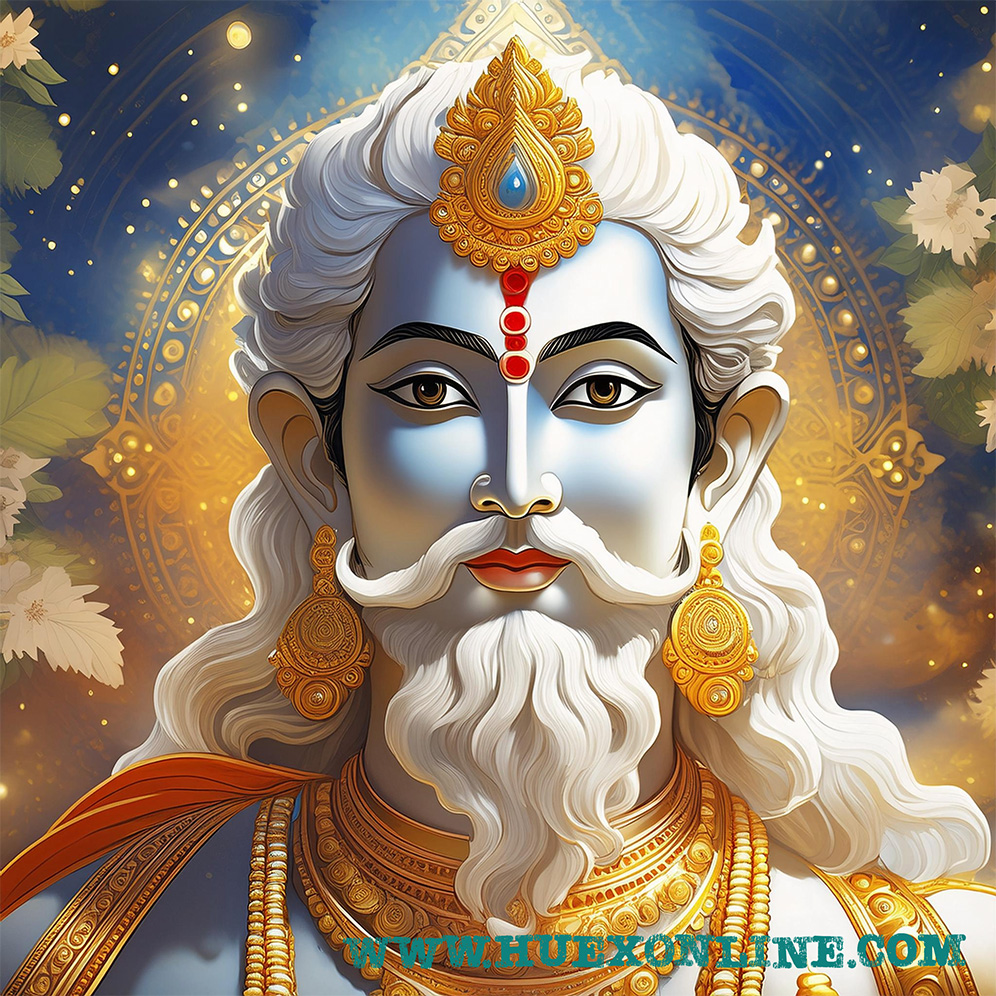
Lord Brahma Picture was developed on June 24, 2024.
--------------
1. Brahman (ब्रह्मन्) or Paramātman (परमात्मन्) refers to the supreme spirit and should not be confused with Brāhmaṇa (ब्राह्मण), though they have the same etymological root.
2. Prajāpati (प्रजापति)
3. Dakṣa (दक्ष - พระทักษะ)
4. Class of gods.
5. Royal sages. Brahmarṣis were of the Brahmana caste. Rājarṣis were Kṣatriyas, but they obtained the status of sage (Rṣi) through their learning.
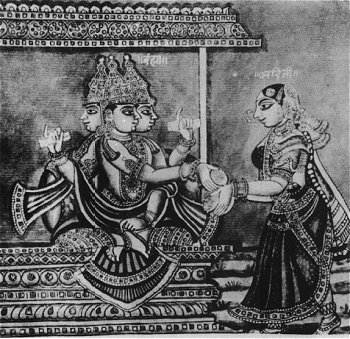 Aditi prayed to Brahma in the 19th century from the Saraswati Mahal Library Collection, Tanjore. This file is from en.wikipedia.org, and its access date is Mar.30, 2023.
Aditi prayed to Brahma in the 19th century from the Saraswati Mahal Library Collection, Tanjore. This file is from en.wikipedia.org, and its access date is Mar.30, 2023..jpg) Thai depiction of the Horse-faced Aśvins on a chariot, Unknow painter, filed on January 1, 1959, from en.wikipedia.org, access date: Mar.30, 2023.
Thai depiction of the Horse-faced Aśvins on a chariot, Unknow painter, filed on January 1, 1959, from en.wikipedia.org, access date: Mar.30, 2023.
.
page 5
'To give a brief example of creation, there are 33,333 gods. The sons of the divine Vivasvat were Bṛhadbhānu, Chakṣus, Atma, Vibhāvasu, Savitṛ, Ṛchīka, Arka, Bhanu, Āśāvaha, and Ravi. Of these sons, Mahya was the youngest, and his son was Devabhrata, also known as Subhrāja. Subhrāja had three famous sons, Daśajyoti, Śatajyoti, and Sahasrajyoti, and each of them gave birth to many offspring. The great Daśajyoti had ten thousand sons. The self-possessed Śatajyoti had ten times that number, and Sahasrajyoti had ten times the number of offspring Śatajyoti had. From them were descended the line of the Kurus, the Yadus, and the Bharatas, the lines of Yayāti, Ikṣvāku, and all Rājarṣis. Many other lineages and diverse living beings were created, as well as their various places of residence.
'The three mysteries of knowledge - the Vedas, Yoga1, and Vijñāna2 - were created, as were Dharma, Artha, and Kāma. The sage saw the various Śāstras, interspersed with Dharma, Artha, and Kāma, and rules of conduct for the world. He also saw the ancient histories, their commentaries, and the Śruti3 texts. This book has the signs of all those; everything is here. Having distilled this excellent knowledge, the sage summarized all that, in both abridged and detailed forms, as a storehouse of knowledge for retaining the wisdom of this world. Some read Bharata from the story of Manu, others from the story of Āstika, and still others from Uparicara. Some Brāhmaṇs read the entire text. Learned men display their knowledge of the Saṃhitās4 by commenting on this collection. Some are skilled in explaining it, others in remembering it.
'After penance and austerities, after having classified the eternal Vedas, Satyavatī's son composed this holy history. This learned Brahmarṣi, the son of Parāśara, followed pure vows.
---------------
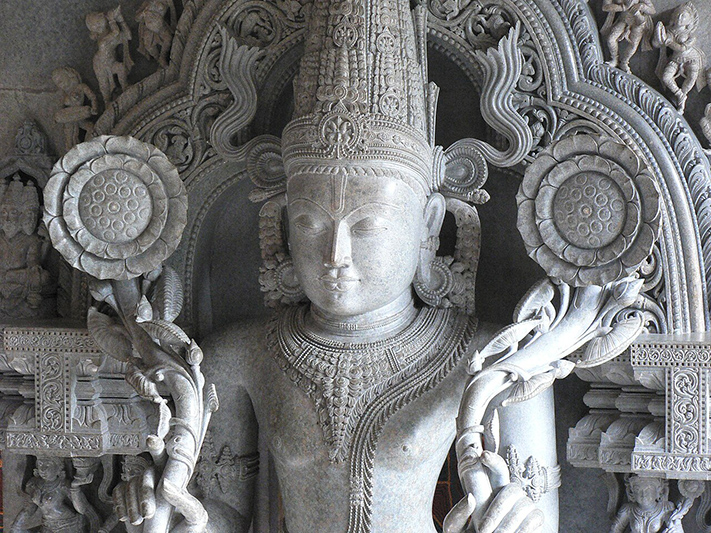
Vivasvat or Sūrya, Found in a Brahmin Temple in New Delhi, Bhārata, source: fr.wikipedia.org, access date: Aug.1, 2024.
1. Union between the human soul and the supreme being.
2. Knowledge obtained through self-realization.
3. Sacred texts in the category of revelation. Śruti (श्रुति) means "that which is heard" and is a divine revelation. It is, therefore, the most reliable text. These were passed down by word of mouth from generation to generation without any modification.
4. Collections of sacred texts, particularly in verse form, specifically the Vedas.
.
.
Page 6
As requested by his mother and at the request of the wise son of Gaṅgā (गङ्गा),1 Kṛṣṇa Dvaipāyana lawfully became the father of three sons in Vicitravīrya2's field.3 These three Kauravas were like three fires. After thus giving birth to Dhṛtarāṣṭra (धृतराष्ट्), Pāṇḍu (पाण्डु), and Vidura (विदुर), he returned to his hermitage to pursue the wise path of austerities. Until these sons were born, grew up, and passed on to the supreme journey,4 the great sage did not reveal Bhārata5 to the world of men. When Janamejaya and thousands of Brāhmaṇas requested him, he taught it to his disciple Vaiśampāyana, seated in his presence. Seated with his compatriots, he (Vaiśampāyana) recited Bhārata at intervals during the sacrifice, being repeatedly asked to continue when he stopped. Vyāsa has described in detail the great lineage of the Kurus, the virtues of Gāndhārī, the wisdom of Vidura, and the constancy of Kuntī. The blessed sage has also described the greatness of Vāsudeva,6 the truthfulness of the Pāṇḍavas, and the evil conduct of the sons of Dhṛtarāṣṭra. Without minor narratives, Vyāsa originally composed Bhārata in 24,000 twenty verses. The learned know this as the real Bhārata. Later, he composed a summary in 150 verses, with an index of the chapters, contents, and events. Dvaipāyana first taught this index to his son Śuka7 and then to other disciples with the same qualities. Nārada8 recited it to the gods, Asita-Devala9 to the ancestors, Śuka to the Gandharvas10, and Yakṣas and Rākṣasas.
'Durayodhana is an excellent tree created out of passion, Karṇa is its trunk, Śakuni is its branches, Duḥśāsana is the plentiful fruit and flowers, and the mindless Dhṛtarāṣṭra is its root. Yudhiṣṭhira is an excellent tree created out of righteousness, Arjuna is its trunk, Bhīma is its branches, the two sons of Mādrī11 are its plentiful fruit and flowers, and Kṛṣṇa, Brahma and the Brāhmaṇas are the root.
---------------
1. Bhīṣma.
2. Vicitravīrya (विचित्रवीर्य - ผู้กล้าอันงดงาม)
3. That is, he impregnated Vichitraviīya's wife.
4. Death.
5. Bhārata (भारत), an expanded version (24,000 ślokas) from the original version (Jaya - 8,800 ślokas) of the Mahābhārata.
6. Vāsudeva (वासुदेव) - Kṛṣṇa's name, as the son of Vasudeva (वसुदेव).
7. Śuka (शुक)
8. Nārada (नारद) see note 1 of page 1 01. Bālakāṇḍa - Sarga 1-2. The Rāmāyaṇa.
9. Asita-Devala (असित - देवल) - The two ancient sages whose names always occur together.
10. Gandharva (गन्धर्व – Musician - คนธรรพ์) --
A semi-divine species, singers and musicians of the gods.
11. Nakula and Sahadeva.
.
.
Page 7
'After having conquered many countries with war and bravery, Pāṇḍu retired to the forest with the sages because he was fond of hunting. When out hunting, he brought great misfortune on himself by killing a stag when it was with its mate. Since their birth, Pṛthā's01 sons spent their lives there, according to the prescribed norms. By what is laid down in law, their two mothers02 conceived sons from Dharma03, Vāyu04, Śakra05, and the two gods, the Aśvins. They grew up under the care of their two mothers and in the society of holy sages in sacred groves and forests. Then, on their own, the sages took them to the presence and forests. Then, on their own, the sages took them to the presence of Dhṛtarāṣṭra and his sons. They were dressed as Brahmacārīs06 students, with sacred tufts in their hair. The sage said, "These students of ours are the sons of Pāṇḍu, your sons, brothers, and friends." Saying this, the sage left. On seeing the sons of Pāṇḍu who had thus been left with them, the Kauravas, the learned among the castes and the townpeople they exclaimed loudly with joy. However, some said they were not the sons of Pāṇḍu when Pāṇḍu had died long ago. However, voices were heard from all directions, saying they were welcome nonetheless. Through great fortune, Pāṇḍu's offspring could now be seen. They must be welcomed. Such voices were heard everywhere. When the tumult of the people had died, an enormous outcry was heard from invisible beings, and all the directions echoed. As Pārtha08 and the others entered, there was a shower of fragrant flowers and the sound of conch shells and kettledrums. It was a great wonder. Delighted by their love for them, the townspeople's loud cries rose to heaven and increased the Pāṇḍavas' fame.
'Without threats from anywhere, the Pāṇḍavas lived there, studying the Vedas and various other Śastras09. All the people respected them. The townspeople were delighted with the purity of Yudhiṣṭhira, the strength of Bhīma, the courage of Arjuna, the humility of the twins, and the submissiveness of Kuntī to her elders.
---------------
01. Pṛthā (पृथा - ปฤถา) - Kuntī (कुन्ती). - A Vīramāta (มารดาแห่งวีรบุรุษ); the surname of Kuntī. A sister of Vasudeva. Became the adopted daughter of the childless Kuntibhoja (कुन्तिभोज - กุนติโภช), a friend of her father, Śūra. She pleased sage Durvāsa by service and obtained some mantras; she invoked the Sun God before her to test their efficacy. She requested him to return. But he conferred a son on her when she was a maiden and went away. Afraid of scandals, she abandoned the child in the river and later became the wife of Pāṇḍu; she gave birth to three famous sons, all Devaputras (เทพบุตร) and equal to Indra. Yudhiṣṭhira from Dharma, Bhīma from Māruta10, and Arjuna from Indra.
02. Kuntī and Mādrī.
03. Dharma, another name for Yama.
04. Vāyu (वायु) refers to the 'wind' or Māruta (मारुत).
05. Śakra (शक्र - ท้าวสักกะ) - A synonym of Indra.
Vānaprastha, a painting by Niharranjan Sen Gupta, date: Unknown, source: https://archive.org via en.wikipedia.org, access date: Sep.17, 2024.
06. Brahmacārī or Brahmachari (ब्रह्मचारी) - Those in the celibate stage of life. One who lives in Brahman or universal consciousness—A celibate student under the care of a spiritual master. One in the first order of spiritual life. In the Vedic social order, the student class who strictly accept the vow of celibacy, in the case of brāhmaṇas, up to the age of 25, at which time they may marry or continue the life of celibacy, a celibate student of a spiritual master; A member of the first spiritual division of life, according to the Vedic social system of four āśramas07.
07. Āśrama (आश्रम) - Age-based stages of human life in the Ancient Hindu system comprised of:
1st stage: Brahmacharya (ब्रह्मचर्य) - Bachelor student.
2nd stage: Gṛhastha (गृहस्थ) - married householder
3rd stage: Vānaprastha (वानप्रस्थ) - Way of the forest or Forest road.
4th stage: Sannayasa (संन्यास ) - renunciation ascetic.
08. Pārtha (पार्थ) - Arjuna. The son of Pṛthā.
09. Śastras or Shastra (शस्त्र).
10. Māruta (मारुत) —The Wind God, appointed father of Bhīma.
.
.
Page 8
The entire world was content with their quality of courage.
'After a few years, in an assembly of kings where the maiden Kṛṣṇā01 was to choose her bridegroom, Arjuna performed a difficult task and won her hand. From that day, he was respected by everyone in the world as a great archer. He became like a Sun on the battlefield, harrowing to behold. He defeated all the kings and all the main tribes. Thus, the king02 could now perform the Rājasūya 03 sacrifice. Through the wise counsel of Kṛṣṇa and the prowess of Bhīma and Arjuna, Yudhiṣṭhira killed Jarāsandha04 and the swollen-head king of Cedī05 and thus obtained the right to perform the Rājasūya, rich in provisions and sacrificial offerings and full of merit. Durayodhana came to this sacrifice and saw from all sides the great wealth of the Pāṇḍavas — the offerings, precious stones, gold, jewels, cattle, horses, elephants, and treasure. On seeing this, his envy made him angry. He fumed when he saw the assembly hall, like a celestial chariot built by Maya. Before Vāsudeva, he was mocked by Bhīma, who said he was of common birth when he got confused by the architectural deceptions.
'It was reported to Dhṛtarāṣṭra that while he was enjoying himself with various objects and valuable things, his son had turned pale, yellow, and thin. Out of affection for his son, the blind king permitted him to play the game of dice. When Vāsudeva heard this, he became furious. Though he was not pleased, he did nothing to stop the dispute and overlooked the fatal game and other unjust acts as they increased in importance. Despite Vidura, Bhīṣma, Droṇa06, and Kṛpa07, the son of Śāradvata08, he made the Kṣatriyas kill each other in the great war that followed.
'On hearing the news of the Pāṇḍavas victory and knowing the vows taken by Durayodhana, Karṇa, and Śakuni, Dhṛtarāṣṭra thought for a while and then told Sanjaya09: "O Sanjaya! Listen to all that I am about to say.
---------------
01. Kṛṣṇā (कृष्णा) - Draupadī and another name for Pāñcālī (पाञ्चाली).
02. Yudhiṣṭhira.
03. Rājasūya (राजसूय - ราชสูยะ) - A great sacrifice at the time of coronation, when other kings and princes pay tribute and accept the superiority of the crowned universal monarch.
04. Jarāsandha (जरासन्ध - ชราสันธ์) - The King of Magadha. He was killed by Bhīma. (Sabhā Parva).
05. Śiśupāla (शिशुपाल) - A king who was an enemy of Kṛṣṇa. The son of Damaghoṣa and King of Cedī (चेदी - or Chedi). He was an incarnation of Jaya, a gatekeeper of Vaikuṇṭha. Lord Śrī Kṛṣṇa killed him during the Rājasūya sacrifice.
06. Droṇa (द्रोण) or Droṇācārya (द्रोणाचार्य) - The teacher in archery of the Pāṇḍavas and the Kauravas.
07. Kṛpa (कृप - กฤปะ หรือ กฤปาจารย์) - He was a council member of Kuru Kingdom and a teacher of the Pāṇḍavas and the Kauravas.
08. Śāradvata (शारद्वत or Sharadvata) - A name of Kṛpa (Born to warrior-sage Śāradvan and Apsarā - अप्सरा), the guru of Parikṣit welcomed Vidura to Hastināpura.
09. Sanjaya (सञ्जय - victory - สัญชัย) - Sanjaya is a disciple of Sage Vyāsa. He is stated to have the gift of Divyadṛṣṭi10 (divine vision), the ability to observe distant events within his mind, granted by Vyāsa. He narrates to Dhṛtarāṣṭra the events of the Kurukṣetra War, including the ones described in the Bhagavad Gītā.
10. Divyadṛṣṭi (दिव्यदृष्टि - ทิพยทฤษฏิ - นิมิตอันศักดิ์สิทธิ์) or Divyadrishti or Divya-drishti - "divine sight'
.
.
Page 9
You will then find that I am not worthy of contempt. You are learned in the sacred texts, intelligent, wise, and respected for being wise. My inclinations were not for war, nor do I find pleasure in the destruction of my lineage. I have no particular affinity towards my sons compared to those of Pāṇḍu. My sons, following the wrong path, were upset with me because I was old and blind. I bore all that because of my weak state and because of my love for my sons. I was deluded and silly, and Durayodhana's folly thrived on that. He saw the wealth and power of the sons of Pāṇḍu at the Rājasūya sacrifice and was mocked for his awkwardness when he ascended the hall. He could not bear this but could not defeat the Pāṇḍavas on the battlefield. Unlike a Kṣatriya and incapable of energetically pursuing wealth, he planned an unjust game of dice with the help of the king of Gāndhāra01. O Sauti! Listen to my words and learn all that happened later and all that I came to know. When you hear what I say and remember, you will know that my wise eyes have the gift of foresight.
' "O Sanjaya! I had no hope of victory when I heard that, in the presence of all the kings, Kṛṣṇā02 was taken; when the excellent bow was drawn and pierced, the target fell to the ground.
' "O Sanjaya! I had no hope of victory when I heard that Subhadrā03 of the Madhu04 lineage was forcibly carried away by Arjuna and married in Dvārakā05 and when the two heroes06 of the Vṛṣṇi07 lineage set out for Indraprastha08.
' "O Sanjaya! I had no hope of victory when I heard that Arjuna had satisfied Agni09 by giving him the Khāṇḍava Vana10 and when he used his divine arrows to check the downpour brought down by the king of the gods.
' "O Sanjaya! I had no hope of victory when I heard that Yudhiṣṭhira had been defeated in the game of dice by Saubala11 and deprived of his kingdom, though his powerful brothers were still in attendance.
---------------
01. Gāndhāra (गान्धार) - King of Gāndhāra is Śakuni (शकुनि) - A stretch of land of ancient Bhārata. It is believed that this land stretched from the shores of the Sindhu River to Kābul. Subala was a mighty ruler of this country. His daughter Gāndhārī was the wife of Dhṛtarāṣṭra. (Śloka 11, adhyāya 111, Ādi Parva).
02. Draupadī.
03. Subhadrā (सुभद्रा) - Sister of Śrī Kṛṣṇa. Birth. Subhadrā was Vasudeva's daughter by his wife Devakī. She had two brothers, Kṛṣṇa and Sāraṇa, and she was her father’s pet child. {Śloka (Verse) 18, adhyāya (Chapter) 217, Ādi Parva,}, queen of Arjuna, mother of Abhimanyu (अभिमन्यु), and grandmother of Parīkṣit (परीक्षित्), younger sister of Kṛṣṇa.
04. Madhu (मधु - sweet, honey) - The Name of Śiva, the Yādavas or Māthuras is the race of Madhu.
05. Dvārakā (द्वारका) - The island kingdom of Lord Kṛṣṇa, lying off Bhārata's west coast, where He performed pastimes five thousand years ago. The capital city of the Yadus. Lord Kṛṣṇa had this city built to protect the Yadus from the attacks by the demons. It is an island off the eastern part of Bhārata, now known as Gujarat. When Lord Kṛṣṇa left this world, the ocean enveloped the whole city.
06. Kṛṣṇa and Balarāma.
07. Vṛṣṇi or Vrishni (वृष्णि) - The line of Kings beginning with Vṛṣṇi (The famous king of the Yadu dynasty) is called the dynasty of Vṛṣṇi.
08. Indraprastha (इन्द्रप्रस्थ) - Capital city of the Pāṇḍavas. It is the same as Delhi, the capital of modern Bhārata.
09. Agni (अग्नि) - The god of fire; son of Brahmā; the divine personification of fire sacrifice; regarded as the mouthpiece of the demigods and their messenger to mankind.
10. Khāṇḍava Vana or Khāṇḍavaprastha or Khandava Forest (खाण्डव वन - ขาณฑวะ วนา หรือ खाण्डवप्रस्थ - ขาณฑวะปรัสถ์) a forest mentioned in the epic Mahābhārata. It lay to the west of the Yamuna River. The Pāṇḍavas are described as having cleared this forest to construct their capital city, Indraprastha. This forest was earlier inhabited by Nāgas led by a king named Takṣaka (तक्षक).
11. Saubala or Soubala (सौबल) - One of the epithet names of Śakuni.
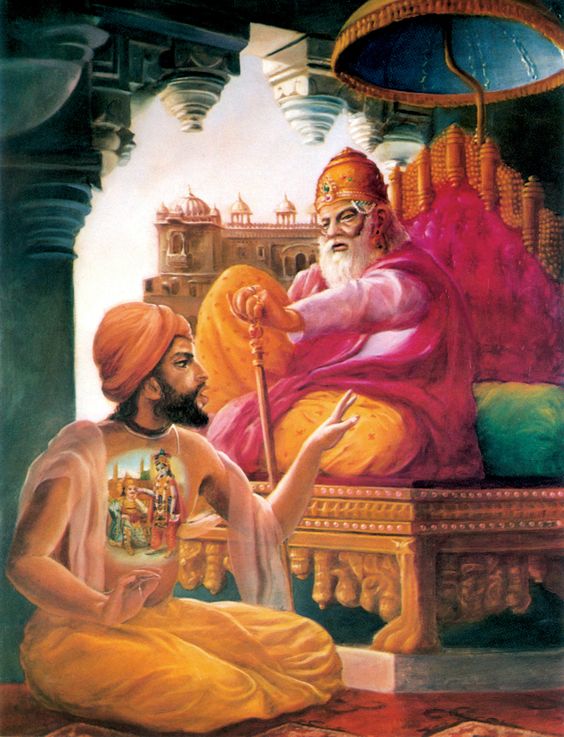 Sanjaya narrates to Dhṛtarāṣṭra the events of the Kurukṣetra War, source: asitis.com via www.pinterest.com, access date: Sep.24, 2024.
Sanjaya narrates to Dhṛtarāṣṭra the events of the Kurukṣetra War, source: asitis.com via www.pinterest.com, access date: Sep.24, 2024.
.
Page 10
' "O Sanjaya! I had no hope of victory when I heard that Draupadī, with protectors but as if no protectors existed, was dragged to court at the time of her period, with a single garment on and with tears in her throat.
' "O Sanjaya! I had no hope of victory when I heard that the grieving and righteous Pāṇḍava brothers left for the forest, suffering out of love for the eldest.
' "O Sanjaya! I had no hope of victory when I heard thousands of Snātakas01 and great Brāhmaṇas who lived on alms followed Dharmarāja02 to the forest.
Arjuna got Pāśupata from Bhagavān Śiva, source: x.com, access date: Sep.25, 2024.
' "O Sanjaya! I had no hope of victory when I heard that Arjuna had pacified in combat the god of the gods, Śiva, who appeared before him in the form of Tryaṃbaka (the Three-eyed) in the disguise of a hunter and obtained from him the great weapon Pāśupata03.
' "O Sanjaya! I had no hope of victory when I heard Arjuna, bound by his promise, had gone to heaven and learned properly from Indra to use celestial weapons.
' "O Sanjaya! I had no hope of victory when I heard that Bhīma and the other sons of Kuntī, accompanied by Vaiśravaṇa,04 had gone to the land inaccessible to humans.
' "O Sanjaya! I had no hope of victory when I heard that my sons, spurred by Karṇa's advice, had gone on a cattle-related expedition, been captured by the Gandharvas, and then freed by Arjuna.
' "O Sanjaya! I had no hope of victory when I heard that Dharma had appeared before Dharmarāja05 in the disguise of the yakṣa and posed questions that were correctly answered.
' "O Sanjaya! I had no hope of victory when I heard that when the great-spirited Arjuna lived in the kingdom of Virāṭa, my best had been destroyed by Arjuna on a single chariot.
---------------
01. Snātaka or Snataka (स्नातक) - A Brāhmaṇa who has finished his period of study and celibacy (Brahmacharya) and is about to enter (or just entered) the householder stage (Gṛhastha) is known as a snātaka.
02. Dharmarāja (धर्मराज) - Yudhiṣṭhira.
03. Pāśupata or Pashupata (पाशुपत) - The missile of Śiva. During his exile in the forests, Arjuna performed penance to appease Śiva and obtained this missile from him.
04. Vaiśravaṇa or Vaishravana (Sanskrit: वैश्रवण or Bali:वेस्सवण ) - Kubera.
05. Yudhiṣṭhira
.
.
Page 11
' "O Sanjaya! I had no hope of victory when I heard that the king of Matsya01 had, with great honor, bestowed his daughter Uttarā02 on Arjuna, and he had accepted her for his son.
' "O Sanjaya! I had no hope of victory when I heard that Yudhiṣṭhira, defeated, wealth-less, exiled, separated from friends and relatives, had been able to raise seven Akṣauhiṇīs03.
' "O Sanjaya! I had no hope of victory when I heard Nārada declare that Kṛṣṇa and Arjuna were Nara and Nārāyaṇa and that he had seen them thus in Brahma.
' "O Sanjaya! I had no hope of victory when I heard that Kṛṣṇa of the Madhu lineage, who had covered the world with one foot,04 had been engaged on the side of the Pāṇḍavas.
' "O Sanjaya! I had no hope of victory when I heard Karṇa and Duryodhana plotted to revile Keśava05, but he had shown himself in many forms.
' "O Sanjaya! I had no hope of victory when I heard that Pṛthā06 had been consoled by Keśava when she stood in front of his chariot, weeping in sorrow at his departure.
' "O Sanjaya! I had no hope of victory when I heard that Vāsudeva had become their advisor and Śaṃtanu's son, Bhīṣma and Bharadvāja07 had pronounced blessing on them.
' "O Sanjaya! I had no hope of victory when I heard that Karṇa had told Bhīṣma that he would not fight if Bhīṣma fought, and saying this had gone away.
' " O Sanjaya! I had no hope of victory when I heard that Vāsudeva, Arjuna, and the immeasurable Gandiva bow had come together, a threesome of fearful energy.
' "O Sanjaya! I had no hope of victory when I heard that Arjuna, overcome by lassitude, had sunk on his chariot, and Kṛṣṇa had shown him all the worlds within his own body.
---------------
01. Matsya (मत्स्य) - in the Madhyadeśa, on the way from Dvārakā to Hastināpura; visited by Vidura; the king of, vanquished by Kṛṣṇa, the king of Matsya is Virāṭa (विराट).
02 . Uttarā (उत्तरा) - The daughter of King Virāṭa and the wife of Abhimanyu. Virāṭa first wanted Arjuna to marry his daughter, but Arjuna declined and said his son, Abhimanyu, should marry her. Uttarā became the mother of King Parīkṣit.
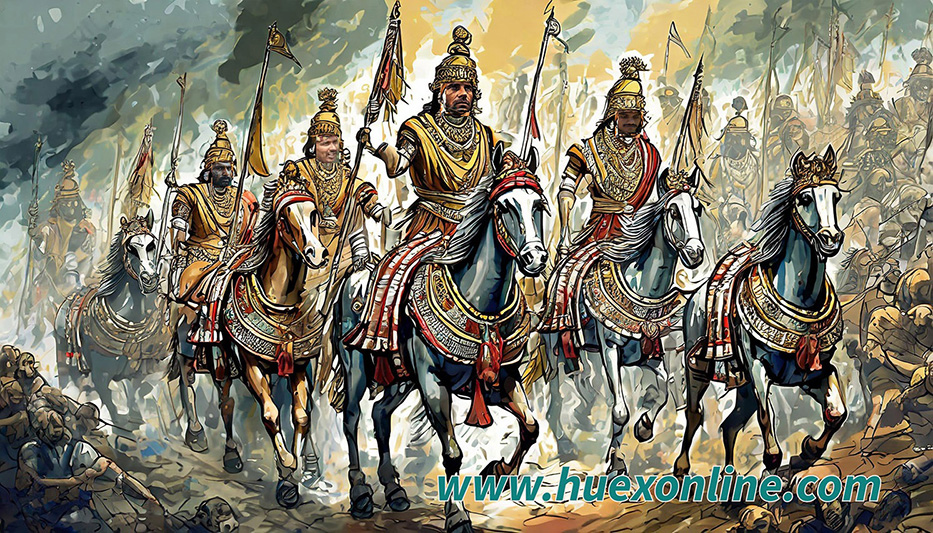
One of the Kaurva troops developed on Oct.3, 2024.
05. Keśava or Keshava (केशव - One who has beautiful long hair) - One of the 108 names of Kṛṣṇa or another name of Viṣṇu.
06. Kuntī.
07. Droṇācārya or Dronacharya (द्रोणाचार्य) - The son of Bharadvāja.
.
.
Page 12
' "O Sanjaya! I had no hope of victory when I heard that Bhīṣma, the great destroyer of enemies, was killing tens of thousands01 of charioteers every day but had not killed a single warrior of note.
' "O Sanjaya! I had no hope of victory when I heard that Arjuna, having placed Shikhandi before him, had defeated the infinitely courageous Bhīṣma, unconquered in many battles.
' "O Sanjaya! I had no hope of victory when I heard that the old warrior Bhīṣma, after killing the somaka02 warriors until only a few remained, was lying on the bed of arrows, wounded by an arrow with a multicolored feathered tip.
' "O Sanjaya! I had no hope of victory when I heard that Śaṃtanu's son Bhīṣma was lying there and was thirsty, and Arjuna pierced the ground to slake his thirst.
' "O Sanjaya! I had no hope of victory when I heard that Śukra03 and Surya04 united to bring victory to the sons of Kuntī, and fierce beasts of prey were always around us.
' "O Sanjaya! I had no hope of victory when I heard that Droṇa displayed the paths of many weapons in the course of battle but failed to kill a single one of the chief Pāṇḍavas.
' "O Sanjaya! I had no hope of victory when I heard that the great warriors,05 the Sanshaptakas,06 who had been placed to kill Arjuna, were killed by him.
' "O Sanjaya! I had no hope of victory when I heard that Subhadrā's brave son07 had single-handedly penetrated our secret battle formation08, impenetrable to others and guarded by the well-armed son of Bharadvāja09 himself.
---------------
01. Instead of tens of thousands, this can also be translated as many.
02. Warriors from the Pañcāla or Panchala (पञ्चाल) region.
03. Śukra or Shukra (शुक्र ) - Venus, also a sage.
04. The Sun.
05. There was a hierarchy of warriors. Mahābhārata can loosely be translated as a great warrior. However, a maharatha was a warrior who could take on ten thousand warriors single-handed.
06. Warriors who swore never to withdraw from the battlefield.
07. Abhimanyu.
08. Cakravyūha (चक्रव्यूह) - “A Phalanx.”—A particular pattern of army formation on the ground. Droṇācārya formed a Cakravyūha wherein Abhimanyu, son of Arjuna, got himself trapped and killed.
09. Droṇa
.
.
Page 13
' "O Sanjaya! I had no hope of victory when I heard that all our great warriors, unable to defeat Arjuna, combined to surround and kill the boy Abhimanyu and then rejoiced.
' "O Sanjaya! I had no hope of victory when I heard that the mindless warriors of Dhṛtarāṣṭra cheered with delight at killing Abhimanya and the furious Arjuna took his vow about the king of Sindhu.01
' "O Sanjaya! I had no hope of victory when I heard Arjuna vowed to kill the king of Sindhu and kept his vow amid his enemies.
' "O Sanjaya! I had no hope of victory when I heard that on finding the horses of Dhanañjaya02 exhausted, Vāsudeva unyoked them on the battlefield, gave them water to drink, and then, re-yoking them, drove on.
' "O Sanjaya! I had no hope of victory when I heard Arjuna, on his chariot, fended off all warriors with his Gandiva bow when the horses that drew his chariot were indisposed.
' "O Sanjaya! I had no hope of victory when I heard that Yuyudhana03 of the Vṛṣṇi race threw Droṇa's army into disorder with the strength of his unassailable elephant and returned to where Kṛṣṇa and Pārtha04 were.
' "O Sanjaya! I had no hope of victory when I heard that Karṇa, with Bhīma in his power, spared his life with some abusive words and dragged the warrior with the tip of his bow.
' "O Sanjaya! I had no hope of victory when I heard that Droṇa, Kritavarma, Kripacharya, Karṇa, Droṇa's son05, and the brave king of Madra06 allowed the king of Sindhu07 to be killed in their presence.
---------------
01. Jayadratha.
02. Dhanañjaya or Dhananjaya (धनञ्जय) - A name for Arjuna means "he who attains great wealth by conquest." refers to Arjuna's collecting vast wealth while conquering the many kings of northern Bhārata for Yudhiṣṭhira's Rājasūya sacrifice.
03. Satyaki.
04. Arjuna.
05. Ashvatthama.
06. Śalya or Shalya.
07. Jayadratha.

Patung Satria Gatotkaca (घटोत्कच - Ghaṭotkaca Statue), Near the Ngurah Rai International Airport, Bali, Indonesia, source: flickr.com, access date: November 1, 2022.
.
.
Page 14
' "O Sanjaya! I had no hope of victory when I heard that the celestial spear, given by the king of gods,01 was diverted by Mādhava,02 to the demon Ghaṭotkaca, of terrible form.
' "O Sanjaya! I had no hope of victory when I heard that in the fight between Karṇa and Ghaṭotkaca, the spear that would have killed Savyasāci03 in battle was unleased by the son of the charioteer.04
' "O Sanjaya! I had no hope of victory when I heard that Dhṛṣṭadyumna05, violating all norms of what was right, killed Droṇa while he was alone on his chariot, insensate and bent on dying.
' "O Sanjaya! I had no hope of victory when I heard that Nakula, the son of Mādrī, engaged the son of Droṇa06 in a chariot duel before all the people and proved himself to be equal in war.
' "O Sanjaya! I had no hope of victory when I heard that after Droṇa's death, Droṇa's son misused the celestial weapon Nārāyaṇa but failed to kill the Pāṇḍavas.
' "O Sanjaya! I had no hope of victory when I heard that the exceedingly brave Karṇa, unconquerable in war, was killed by Arjuna in a fraternal war that was beyond comprehension even to the gods.
' "O Sanjaya! I had no hope of victory when I heard that the son of Droṇa,07 the brave warrior Duḥśāsana and the fearsome Kṛtavarman08 failed to defeat Dharmarāja Yudhiṣṭhira.
' "O Sanjaya! O Bard! I had no hope of victory when I heard that Yudhiṣṭhira killed the king of Madra,09, who constantly taunted Kṛṣṇa in battle.
' "O Sanjaya! I had no hope of victory when I heard that evil Saubala,10 the cause of the game of dice and the quarrel, though armed by magic, was killed in battle by the Pāṇḍava Sahadev.
---------------
01. Indra was the king of the gods. The celestial spear (शक्ति - Śakti or Shakti) Indra gave to Karṇa is not mentioned by name in this śloka; the next śloka is explicit.
02. Mādhava (माधव) - Kṛṣṇa. - A name for the Supreme Personality of Godhead meaning “He who appeared in the Madhu dynasty.” It is also a name for the Yadu dynasty and a name of Kṛṣṇa, comparing Him to the sweetness of springtime or honey.
03. Savyasāci or Savyasachi (सव्यसाचि) - Arjuna - Ambidexter, one who can use both hands with equal facility and effect, who could use his bow with the same skill with either hand.
04. Karṇa.
05. Dhṛṣṭadyumna (धृष्टद्युम्न or Dhrishtadyumna).
06. Aśvatthāmā (अश्वत्थामा).
07. Aśvatthāmā.
08. Kṛtavarman (कृतवर्मन् or Kritavarma).
09. Śalya or Shalya (शल्य) - King of Madra (मद्र).
10. Śakuni - Saubala or Soubala (सौबल)
1.
2.
Page 15
' "O Sanjaya! I had no hope of victory when I heard that Duryodhana, weakened in strength, without a chariot, tired, and with his pride broken, went to a pond and lay in its waters.
' "O Sanjaya! I had no hope of victory when I heard that the Pāṇḍavas, accompanied by Vāsudeva, stood at the pond of the Gaṅgā and addressed my quarrelsome son with contempt.
' "O Sanjaya! I had no hope of victory when I heard that, in the battle of the clubs, despite displaying various marvelous circuits,01 he was unjustly killed through the advice of Vāsudeva.
' "O Sanjaya! I had no hope of victory when I heard that the son of Droṇa02 and others committed a horrible and infamous act by killing the Pañcālas03 and the sons of Draupadī04 while they slept.
' "O Sanjaya! I had no hope of victory when I heard that, pursued by Bhīmasena05 and angered, Aśvatthāmā discharged the greatest of weapons named Aiṣīka06, which killed the unborn in the womb.
' "O Sanjaya! I had no hope of victory when I heard that the weapon Brahmaśirāstra,07 was discharged by Aśvatthāmā and repelled with another weapon by Arjuna, which he then pacified. Still, Aśvatthāmā had to surrender the jewel on his head.
' "O Sanjaya! I had no hope of victory when I heard that the son of Droṇa08 killed the unborn in the womb of the daughter of Virāṭa09 through a great weapon and that the son of Droṇa was cursed jointly by Dvaipāyana and Keśava.
' "Alas! Woe to Gāndhārī, who has lost her sons, grandsons, friends, fathers, brothers, and relatives. The Pāṇḍavas have accomplished a difficult feat. They have again gained a kingdom without a rival.
' "Alas! I have heard that only ten people have survived this difficult war, three on our side and seven on the side of the Pāṇḍavas. In that fearful war of Kṣatriyas, eighteen armies10 have been slain. I see extended and extreme darkness all around me. Delusion overcomes me. O Suta! Consciousness is leaving me; my mind is delirious." '
---------------
01. That is, the circuits of the club.
02. Aśvatthāmā.
03. Dhṛṣṭadyumna (धृष्टद्युम्न) and Śikhaṇḍī or Shikhandi (शिखण्डी) .
04. Prativindhya (प्रतिविन्ध्य) - Son of Yudhiṣṭhira, Sutasoma (सुतसोम) - Son of Bhīma, Śrutakarmā or Shrutakarma (श्रुतकर्मा) - Son of Arjuna (There are different definitions, in the Bhāgavata Purāṇa it is stated that Śrutakarmā was the son of Sahadeva, while in Śrutakīti II it is said that Śrutakarmā was the son of Arjuna.), Śrutasena or Shrutasena (श्रुतसेन ) - Son of Sahadev, and Śatānīka or Satanika (शतानीक) - Son of Nukul.
05. Bhīma (भीम) or Bhīmasena (भीमसेन).
06. Aiṣīka or aishika (ऐषीक) - Consisting of stalks made of reeds or canes.
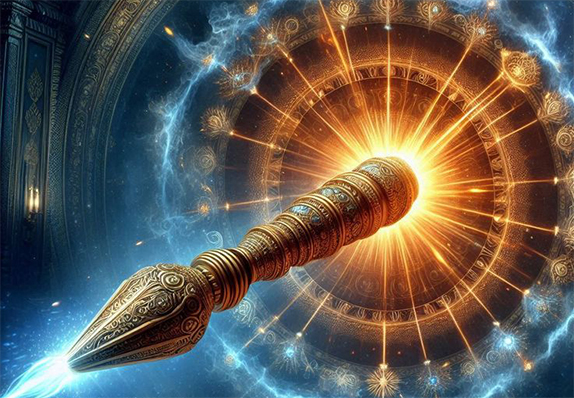
Brahmāstra, source: www.pinterest.com, access date: Oct.21, 2024.
07. Brahmaśirāstra or Brahmashira (ब्रह्मशिरास्त्र) or Brahmāstra (ब्रह्मास्त्र) - This weapon is like an arrow given by Lord Śiva to Sage Agastya (अगस्त्य). It is mentioned in Mahābhārata, Adhyāya 138, Śloka 9, and later given by Agastya to Agniveśa (अग्निवेश). Later, Agniveśa gave it to Droṇa or Droṇacharya. Droṇacharya gave it to Arjuna and instructed him on using this weapon: "You should not shoot this arrow at people. The three worlds will be destroyed if you use it on a lowly person. This weapon has no match in this world. Keep it pure, and listen to what I say. If any non-human enemy attacks you, this weapon can kill him on the battlefield.".
08. Aśvatthāmā.
09. Uttarā (उत्तरा).
10. Akṣauhiṇīs
1.
2.
Page 16
Sauti said, 'Having uttered these words in greatest sorrow and lamented his fate, Dhṛtarāṣṭra became unconscious. On recovering, he addressed Sanjaya in these words.
'Dhṛtarāṣṭra said, "O Sanjaya! Since this has happened, I wish to give up my life immediately. I see no consolation nor profit in being alive any longer." '
Sauti said, 'Then the wise son of Gavalgaṇa01 addressed these words full of meaning to that wretched and lamenting king of the earth.
'Sanjaya said, "From wise Nārada and Dvaipāyana, you have heard of many kings, those who had great enterprise and strength. They were born in great royal dynasties and possessed great virtues. They knew the use of celestial weapons and were equal to Śakra02 in energy. Having conquered the earth with righteous conduct and performed sacrifices with appropriate offerings, they obtained fame and succumbed to the forces of time. Such men were the great warrior Vaiṇya, the brave Sṛñjaya who won through blessings, Suhotra, Rantideva, Kakṣīvant, Oushija, Bālhīka, Damana, Śaivya03, Śaryāti, Ajita, Jita, Viśvāmitra, the slayer of enemies and Ambarīṣa, of great strength, Marutta, Manu, Ikṣvāku, Gaya, Bharata, Rāma, the son of Daśaratha, Śaśabindu, Bhagīratha and Yayāti of good deeds, to whom the inhabitable regions of the earth adorned with sacrificial sheds and stakes. In ancient times, when Śaivya was afflicted with losing his son, these were the twenty-four kings whose acts were cited by the royal sage Nārada. But other kings came and went before, with more power, great warriors, great souls, and blessed with all the good qualities. They were Pūru, Kuru, Yadu, Śūrasena, Viṣvagaśva of great endurance, Anenā, Yuvanāśva, Kakutstha, the brave Raghu, the invincible Vītihotra, Bhava, Śveta, Bṛhadguru, Uśīnara, Śataratha, Kaṅka, Duliduha, Druma, Daṃbhodbhava, Para, Vena, Sagara, Saṃkṛti, Nimi, Ajeya, Paraśu, Puṇḍra, Śambhu, the pure Devāvṛdha, Devahavya, Supratima, Supratīka, Brihadratha,
---------------
01. Sanjaya. Gavalagaṇa (गवल्गण) - Father of Sanjaya.
02. Śakra or Shakra (शक्र) - Indra.
03. Śaivya or Shaivya (शैव्य) - Name of a king and warrior in the Pāṇḍava army.
1.
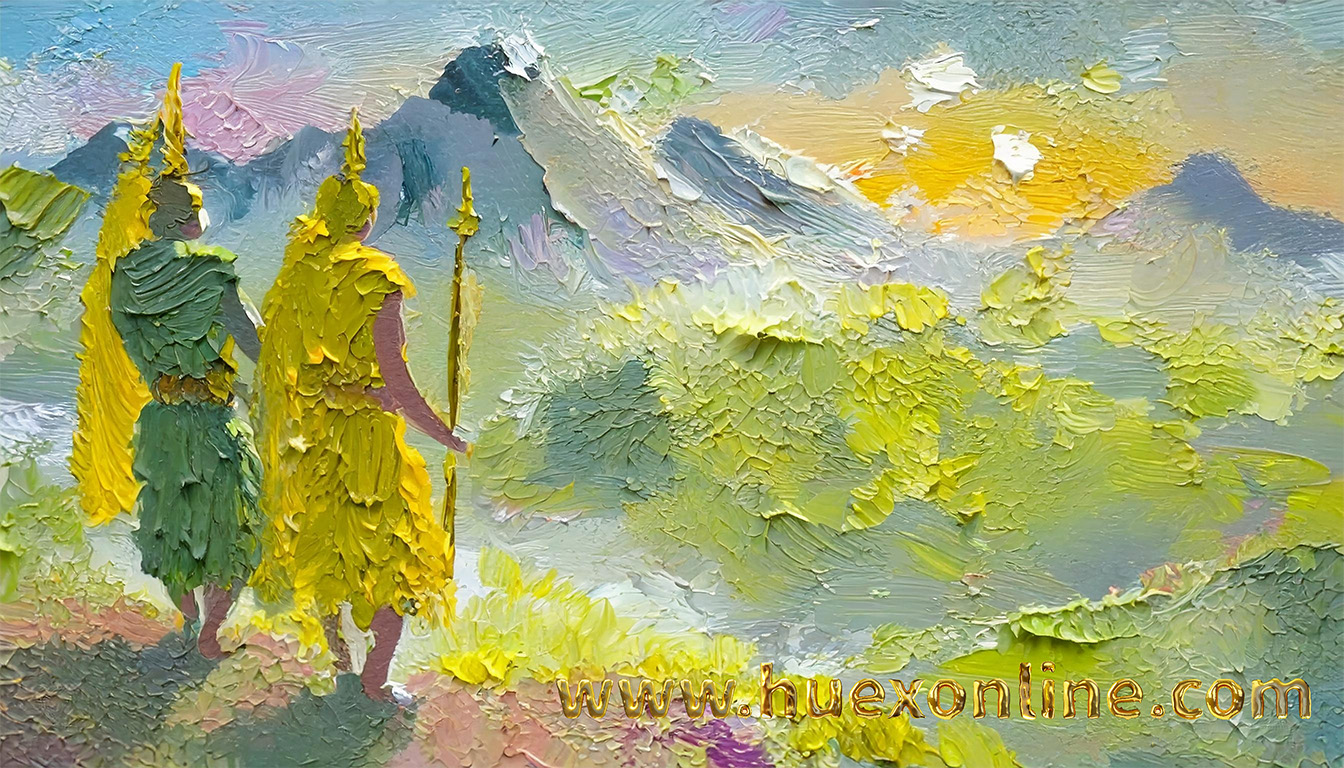
The Ancient Bhārata Warrior Kings were developed on Oct.29, 2024.
1.
2.
Page 17
Mahotsāha, Vinītātman, Nala of the Niṣādas,01 Satyavrata, Śāntabhaya, Sumitra, the lord Subala, Jānujaṅgha, Anaraṇya, Arka, Priyabhṛtya, Śubhavrata, Balabandu, Nirāmarda, Ketuśṛṅga, Bṛhadbala, Dhṛṣṭaketu, Bṛhatketu, Dīptaketu, Nirāmaya, Avikṣita, Prabala, Dhūrta, Kṛtabandhu, Dṛḍheṣudhi, Mahāpurana, Saṃbhāvya, Pratyaṅga, Parahan and Śruti. These kings and hundreds of others, as many as lotuses, have been heard of. Giving up immense wealth and pleasure, these great, powerful, and wise kings attained death, as did your sons. Even those performers of celestial deeds, great souls who had courage, generosity, truth, purity, pity, kindness, faith, and simplicity, and whose abundance of good qualities and riches have been described for the world in the Purāṇas by superior poets of great learning, they too went to their death. Your son was wicked, envious, greedy, driven by passion and evil. Please do not mourn for them. O Dhṛtarāṣṭra! You are knowledgeable in the śastras and characterized by intelligence and wisdom. Those whose understanding follows the norms of the śastras do not succumb to delusion. O king of men! You know the good fortune and misfortune of fate. You know the extreme sentiments you succumbed to in protecting your sons. You should not sorrow for that which was bound to happen. Those who are wise do not feel sorry over fate. Even with the most incredible wisdom, that which is ordained will happen. No one can transgress the path that has been laid down. Time brings existence and non-existence, pleasure and pain. Time creates all elements, and time destroys all beings. Time burns all subjects, and it is time to extinguish the fire. Time walks in all aspects, pervasive and impartial. Knowing that everything, past, present, and future, is created by time, it is not appropriate that you should be consumed by grief." '
Sauti said, 'Kṛṣṇa Dvaipāyana has composed a holy Upaniṣads. The study of Bhārata is so sacred that even if one reads only one line of śloka, all the reader's sins are destroyed. Here are lauded the performers of pure deeds, the gods, the Devarṣis02, the immaculate Brāhmaṛṣis, the yakshas, and the great nagas.
---------------
01. Niṣāda or Nishada (निषाद) - hunter.
02. Devarṣi (देवर्षि) - A Rishi (ṛṣi), a saint of the celestial class, as Nārada, Atri, Marīci, Bharadvāja, Pulastya, Pulaha, Kratu, Bhṛgu, Vasiṣṭha, Prachetas; also Bharata, Tumburu, Kaṇāda, and others.
1.
2.
Page 18
The eternal Lord Vāsudeva has been lauded here. It is he who is truth, immortality, purity, and holy. It is described as the eternal supreme Brahman, the constant, everlasting light whose divine action is defined by the learned. He is the source of the existing and the non-existing, the principle of extension and withdrawal. It has been described as the supreme spirit that assumes the attributes of the five elements01 and three qualities02 and to whom words like un-manifest cannot be applied. Also, through meditation and yoga, free people perceive themselves as being established like reflections in a mirror. He who is always faithful and always follows the path of righteousness, such a man is freed from all sin on reading this adhyāya. From the beginning, the believer who always hears this introductory adhyāya of Bhārata never suffers from difficulties. He who repeatedly utters any part of the introductory adhyāya in the morning or evening is freed from all sins accumulated during the day or night. In the body of Bhārata, this adhyāya is like truth and ambrosia - like butter among curds and Brāhmaṇas among bipeds, like the ocean is the best of the lakes and the cow is the best of the quadrupeds. Just as these are the best, so it is said is Bhārata. He who makes a Brāhmaṇa listens to one verse of śloka at a funeral ceremony, and his offerings of food and drink to his ancestors become inexhaustible. The Vedas should be supported with itihāsa03 and the Purāṇas. But the Vedas should be supported with little learning,04 lest that knowledge be hurt. However, if a learned man recites this Veda of Kṛṣṇa's,05 he will gain. Without a doubt, the sin of killing an embryo is also destroyed. A pure man who has read this adhyāya reverently at every moon change has read the entire Bhārata. The man who reverently listens daily to these sacred verses is said to attain long life and fame and go to heaven.
---------------
01. Earth, water, energy, wind, and sky.
02. Sattva (सत्त्व - The Quality of light or purity), rajas (रजस् - passion), and tamas (तमस् - darkness or inertia).
03. Literally, history. More specifically, the two epics.
04. Though sacred texts, the Vedas have been personified here.
05. Reference here is to Kṛṣṇa Dvaipāyana (Vedavyāsa).
1.
2.
Page 19
In ancient times, the gods and the sages came together, and on one side of a scale, they placed the four Vedas, with Bhārata on the other side. In greatness and weight, Bhārata was heavier. Because of its superiority in substance and content, it came to be known as Mahābhārata, and he who knows this true meaning is freed from all sins. Asceticism is not a sin, studying is not a sin, the natural rules of the Vedas are not sins, and exertion to acquire wealth is not a sin. These become sins when they are abused.'
1.
2.
3.
References:
01. from. "The Mahabharata 1," Translated by BIBEK DEBROY, ISBN: 978-0-1434-2514-4, Penguin Random House, 2015, Printed in Bhārata.
02. from. "The Mahābhārata," An abridged translation by JOHN D. SMITH, ISBN: 978-0-140-44681-4, PENGUIN BOOKS, 2009, Printed in the United States of America, www.penguin.com.
03. from. "The Mahabharata: Complete 18 volume," Veda Vyasa, Kisari Mohan Ganguli, tr. [1883-1896], Publishing in 2021 by Sanzani Publishing.
04. from. http://www.wisdomlib.org.
1.
2.
3.


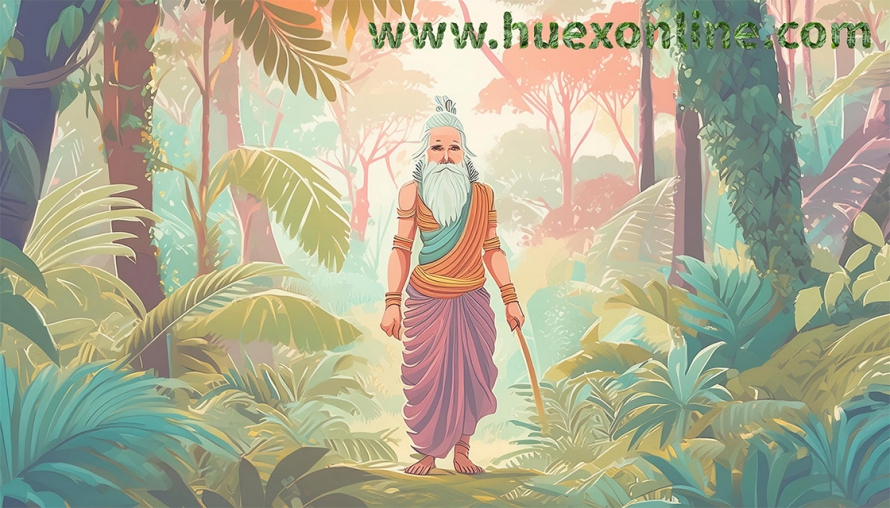



.jpg)

